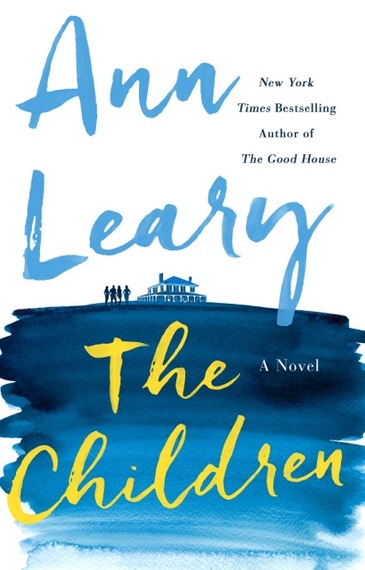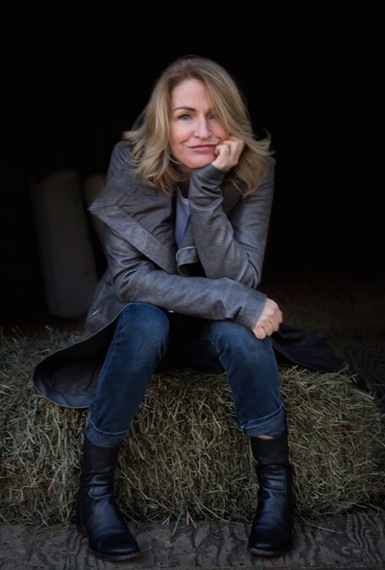Ann Leary's latest novel, The Children, delivers the same page-turning story telling and complexity of characters as her last book, The Good House, which will soon to be a film starring Meryl Streep and Robert De Niro.
Leary explores many of the same themes of The Good House in this latest effort - real estate lust, secret lives and waterfront locales with the addition of a truly sociopathic protagonist whom you will love to hate and lots of internet hacks to boot, all taking place in an elegantly shabby lakefront estate.
It's story of an old-money, quirky and very preppie New England family, told by the reclusive Charlotte who leads a clandestine life on the internet. She lives with her fabulously clueless and penny-pinching mother in the sprawling Connecticut lake house that belonged to her late stepfather, Whit Whitman. While Charlotte and her sister grew up at "Lakeside," their stepbrothers were welcomed as weekend guests. Now the grown boys own the estate, with a provision in the family trust that allows their step-mother to stay. When Spin, the youngest and favorite of all the children, brings his fiancé home the family is at first intrigued then alarmed as multiple cracks in these relationships are revealed as well as an array of resentments and difficult truths.
But it's also funny, very funny. As always, Leary makes dysfunction, pathology and even tragedy completely compelling.
I recently interviewed her about this book, and just as she was open about her own issues with drinking when she wrote The Good House, she is equally candid about her own history with a blended family and her life on the internet:
Nancy Doyle Palmer: This is the story of step-siblings, trust funds and family ties and rifts - where did this come from?
Ann Leary: I grew up in the 60s and 70s, and while I don't know if this is statistically true it seemed there was this kind of mass uncoupling that took place among our parents during that time. I wanted to explore the complicated dynamics that sometimes occur within blended families, not only while the children are young, but also, when they are adults.
I was 14 when my parents divorced. My dad moved to another state, married a woman I didn't know and when I went to their house I was a guest. He had younger step-children - he was a different person with them. And they loved him. They thought he was funny and they had funny nicknames for him and he got a kick out of them. But with us it was always more fraught and it was a little bit more formal and there just wasn't this ease. He was more guarded. He was more careful about us, but with the other kids, he just got to enjoy them and they got to enjoy him.
So in The Children, I have these girls who grew up with a stepfather. They got from their step-father what his own sons didn't get, which was love and a sense of family and his love of music and his aesthetic sense. And eventually, the boys got everything material; the money, the house, everything else.
NDP: Spin, the step-brother, brings this very difficult girlfriend Laurel into the mix and things start to fall apart. Why?
AL: Well, she pushes him to express himself and it turns out he was the one who felt like the outsider in his own home. At one point he's finally raging and says "I own this house, but I have to knock when I come in. I've never been anything but a guest here." Within families, everybody is slightly narcissistic in that we think the other family members experiences things the way we do. So the girls, who were happy growing up there and loved Spin, thought he was happy too the way they were. But he wasn't.
NDP: Talk a bit about the role of the internet in this book - the narrator herself has a blog where she pretends to be the mother of two children, one of whom is severely disabled.
AL: In recent years, since our kids left home, I spend most of the time in the country with our animals. I write every day. My husband ( Denis Leary) is away working much of the time. I love solitude. But I'm also nosy and like to keep in touch with what people are doing, so the internet is the perfect place for me. While researching this book, I lurked in different online communities. Places like Reddit, where there are forums and people just talk about things with strangers. I love those places. I do think that many people who frequent them have full and active lives off the Internet, but I think there are some who really only socialize online. There have always been loners, introverts and people with social anxiety. But now there's a way for them to do what all humans - I guess all mammals need to do. Connect with others.
NDP: Why make Charlotte such an unreliable narrator?
AL: I do love an unreliable narrator. But it's not because I'm trying to pull a fast one on the reader. The narrator's voice has to be believable - the reader has to believe that a real person is telling the story. But that doesn't mean the narrator, the storyteller, has to be reliable. In fact, I think most people in real life are unreliable when they explain their motives or actions. We all try to put our best selves out there and we are sometimes incapable of seeing faults that are obvious to others (especially when it comes to behavioral disorders, substance abuse issues, etc.). Charlotte in The Children and Hildy from The Good House are both in denial. Charlotte isn't really honest with herself about what a recluse she is. She's telling the story, so it's more realistic to have her gloss over that aspect of herself, because that's what people do. The challenge as a writer is to have the reader start to understand the character well enough to see beyond the self she intentionally projects. We all do this with people in real life.
NDP: Not only is your heroine complicated, the antagonist appears to be a world class bitch and sociopath.
AL: Complicated characters and villains are always the most interesting. Everyone wants to play them on stage and in films and usually they are men. I find women more interesting than men. Plenty of men write about men because they find women not as interesting. But, I find women more interesting. I understand them and what makes them tick. And as for Laurel, well, people do want the good person to win. But that doesn't always happen.


